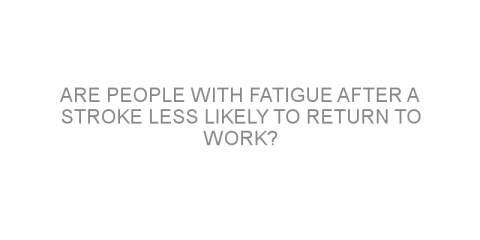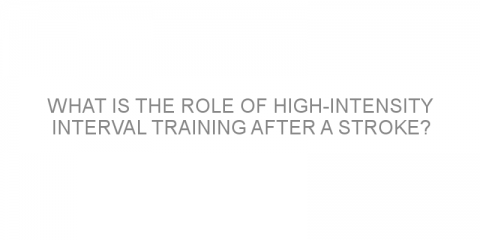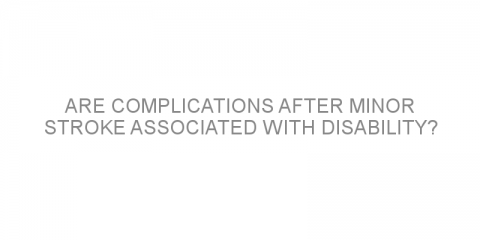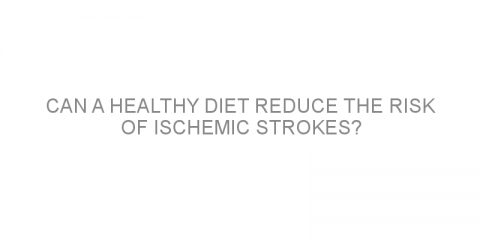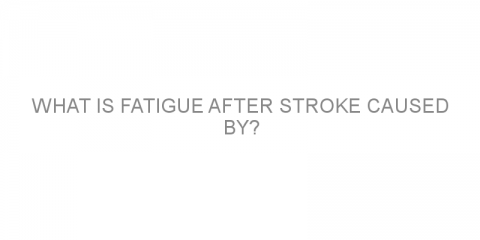In a nutshell This study looked at self-reported levels of fatigue in young stroke survivors 3,6 and 12 months after finishing rehabilitation. It found that patients with higher levels of fatigue were less likely to return to work up to 1 year after a stroke. Some background A stroke can affect many of the functions of the body. In...
Read MoreNumber of stroke(s)-1 Posts on Medivizor
What is the role of high-intensity interval training after a stroke?
In a nutshell This study looked at the effect of high-intensity interval training (HIIT) after a stroke. It found that HIIT improved walking distance, balance, and some parts of brain function in the short term. Some background Exercise is known to be important for stroke recovery. HIIT involves repeated sessions of high-intensity...
Read MoreAre complications after minor stroke associated with disability?
In a nutshell This study investigated factors associated with disability after a minor stroke. Researchers suggested that complications after a first minor stroke are strongly associated with disability or even a second stroke. Some background A stroke happens when blood flow to the brain is cut-off by a blood clot. As oxygen does not reach brain...
Read MoreShould screening for atrial fibrillation in stroke patients be more thorough?
In a nutshell This study looked at whether late diagnosis of atrial fibrillation in stroke patients would result in a higher chance of another stroke. The authors concluded that delayed diagnosis of atrial fibrillation resulted in a higher risk of recurrent stroke, particularly in men. Some background Atrial fibrillation (AF) is when a patient has...
Read MoreIdentifying new markers to screen for recurrent stroke risk
In a nutshell This trial examined whether elevated lipoprotein(a) levels result in an increased risk of recurrent ischemic stroke. The authors concluded that patients who have had one ischemic stroke and have high Lp(a) levels are at a greater risk of further vascular (blood vessel) events. Some background Stroke patients are commonly at a higher...
Read MoreCan a CT help to predict recurrent stroke?
In a nutshell The authors were interested in whether a CT was effective at identifying causes of cardioembolism, which is directly linked with stroke recurrence. They concluded that patients with larger and more complex aortic plaques were at a higher risk of recurrent stroke. They also concluded that CT was as effective as other invasive procedures in...
Read MorePredictors of movement recovery after stroke
In a nutshell This study examined predictive factors of regaining upper limb (arm and hand) movement in stroke patients. The authors concluded that voluntary finger extension (lifting) 4 to 8 weeks after stroke is a good indication for regaining upper limb movement within 6 months. Some background Many stroke patients lose some ability to move....
Read MoreCan a healthy diet reduce the risk of ischemic strokes?
In a nutshell This study investigated a possible link between dietary habits and strokes. The researchers found that stroke patients were less likely to maintain a healthy diet compared to healthy controls. Some background Healthy diet and physical activity have been shown to be beneficial for overall health, but have not been studied in detail...
Read MoreWhat is fatigue after stroke caused by?
In a nutshell This paper studied the factors that increased the chances of fatigue after a stroke. Some background Ischemic stroke occurs when a blood vessel to the brain is blocked and causes damage to the brain. After a stroke, patients often have fatigue. Fatigue is described as exhaustion, weariness and lack of energy that does not go away...
Read MoreAn invitation to evaluate secondary stroke prevention through education
In a nutshell The aim of this trial is to evaluate the effectiveness of a stroke risk factor education program at reducing future stroke risk in patients who have experienced a transient ischemic attack or mild stroke. The effectiveness of the program will be measured through changes in the overall blood pressure in patients taking part in the...
Read More
